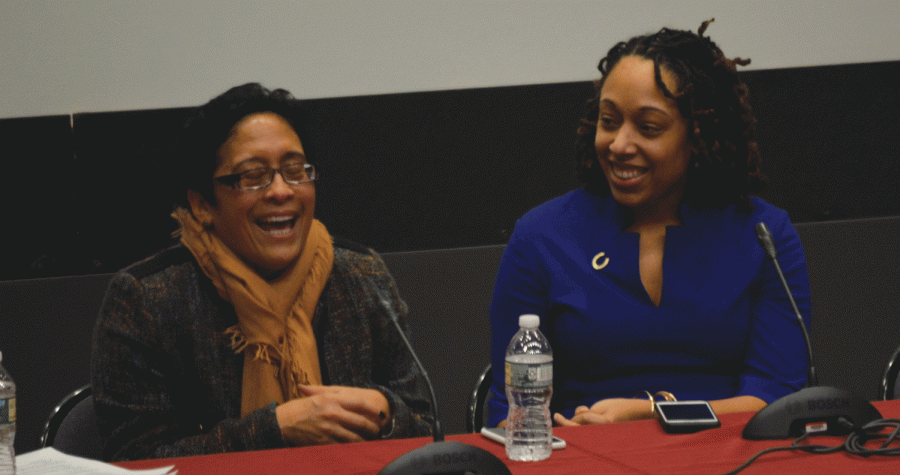Women in Colgate Leadership Discuss Careers and Confidence
Four female campus leaders spoke about their experiences throughout their education and professional careers.
Four Colgate women leaders on campus led the panel “A Conversation About Journeys, Advice, and Opportunities” on Thursday, February 28. The panel featured Provost and Dean of the Faculty Tracey Hucks ’87, Vice President for Communications Laura Jack, Chief of Staff Hanna Rodriguez-Farrar and Vice President and Director of Athletics Nicki Moore. It was moderated by the Dean of Students, Maria del Carmen Flores-Mills.
These women shared their educational and professional backgrounds, divulged their experiences in male-dominated communities, explained their perspectives on mental health and provided advice for students that they wish they had received when they were younger.
Moore said she has been able to successfully navigate the patriarchal world of sports as a woman through positivity, diligence and relationship-building. In each professional space she has inhabited, Moore has reminded herself to be indispensable.
“[I’ve fostered] this habit of looking around whatever space I happen to be in and trying to figure out a way to make it better…Being willing to move has been a core part of my development,” Moore said.
Something that Moore said she still struggles with today, but that she sees as imperative to being successful, is acceptance. To confront and overcome this challenge, she actively practices acceptance of others, but more importantly, acceptance of herself. Moore also said she chalks maintaining her mental health up to sleep, exercise and drinking water.
Jack said she has also dealt with moments of uncertainty in her career.
“I have not seen a lot of leaders that look like me. I think that has been challenging then, when thinking about myself, thinking whether I’m good enough,” Jack said.
She said some days she asks herself whether President Casey knows who he hired.
“[Other days] I tell myself, ‘Oh, I slayed that,’” Jack said.
She said that self-doubt never necessarily goes away, but that she has learned to cope by gaining perspective.
Rodriguez-Farrar said that she never sees things in terms of gender, but rather in terms of capabilities, skills and knowledge. She expressed confidence in her role of expanding the capacity of the president, partly due to her strong educational background.
Rodriguez-Farrar holds two doctorates, one in art history from Brown University and one in microeconomic analysis in education from Howard University. Despite her confidence and these degrees, Rodriguez- Farrar said she still has moments of insecurity.
Rodriguez-Farrar said that sometimes she’ll walk into a meeting and be immediately assumed to be a secretary, and that she sometimes internalizes that.
“[Self-doubt] is going to be something you’re going to struggle with. I think that everyone struggles with it on some level,” she said.
Her advice to the audience, and to her former self, is to be less afraid.
“Be less scared. Scared to try, scared to fail—just be less scared,” Rodriguez-Farrar said. Hucks has always had what seems like an unwavering sense of self. She said much of this outlook stems from her upbringing in Harlem, New York. “[I] socialized in that sense of authenticity,” Hucks said. “[The public education system and community] reinforced that you were from this great tradition of the Harlem Renaissance, you were from this great tradition of Africa…I learned who I authentically am and took that courageously every place I went.” Hucks said that only three percent of black women in academia are on the tenure track and that there are less than two percent of black women who reach the rank of full professor. Being a “statistical anomaly” herself, she feels it is her duty to be a model for other women. Hucks discussed the duty she feels to respect the women who lived and died for her to be where she is today.
“I was in your seat, not just as women, but as Colgate women. You can do this. You can be in these spaces. We’re witnesses and examples that you can make it… You can do it in spite of the fact we navigate a patriarchal society that tried for centuries to relegate women to certain places.”
Junior Emma Stearns said she gained a lot from hearing these women speak.
“I actually didn’t know that there were so many female leaders on campus. It was really inspiring and awakening to realize that those roles are possible for women today.
Contact Lucy Feidelson at [email protected].







